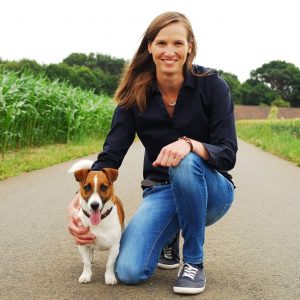Dr. Jana Denissen is a scientist visiting the Animal Welfare Program (AWP) for four months from her home in western Germany where she works at the North-Rhine-Westphalian Chamber of Agriculture. Completing her BSc in Agricultural Science and MSc in Animal Science at Bonn University, Germany, she completed her PhD at Rheinische Friedrich-Wilhelms-University Bonn. Under the direction of Prof. Dr. Karl-Heinz Südekum, she completed her dissertation entitled “Feeding strategies to optimize energy and nutrient provision in lactating dairy cows” (https://www.itw.uni-bonn.de/institut/tierernaehrung/institute/itw). Learn more about her experience both in Germany and with the AWP below.

My career with the North-Rhine-Westphalian Chamber of Agriculture focusses on the professional leadership of the Agricultural Research Center Haus Riswick (https://www.landwirtschaftskammer.de/riswick/). At the center we conduct applied research in the fields of ruminant feeding, pasture management, grasslands, forage crops and the environmental impact of cattle farming. I am responsible for planning, analyzing and publishing research results generated at our facility. Next to my work on the research farm, I am also the primary contact for our consultants who advise dairy farms, for whom I provide support for questions about ruminant feeding. I am also involved in national working groups and committees to develop new practical recommendations for the farmers.
While optimizing dairy cattle nutrition helps promote the health and productivity of the animals and consequently contributes to their welfare, dairy cattle welfare is also influenced by many other factors. From my point of view, animal welfare can only really be improved by taking a more holistic approach which includes considering the emotional states of the animals. In order to gain a more in depth understanding of animal welfare I reached out to Dr. Marina von Keyserlingk in the summer of 2021. She encouraged me to come for a short sabbatical and to immerse myself in the ongoing research currently underway by the UBC Animal Welfare Program. This experience has allowed me to learn more about indicators that can be used to evaluate animal welfare and methods for optimizing animal welfare.
During my stay I have been living on the UBC Dairy Education and Research Centre and participating in a range of research activities. One aspect that I rarely considered before coming to UBC was the notion that the individual animal matters. To this end I am impressed by each calf’s strongly pronounced individual reaction to the situations that they encounter on the farm. This illustrates to me once again that we need to adapt our animal husbandry systems to better meet the needs of individual animals when housing them in groups. This will require developing new complex systems that consider animal welfare, ecology and economics. This short research stay has been an excellent opportunity to get insight into the world renowned UBC AWP research program and increase my personal network. I enjoy meeting people from all over the world, all with different backgrounds but all with the same goal of understanding animal behavior and improving animal welfare. This opportunity has also allowed me to learn about the Canadian culture and the surrounding agricultural communities that came together during the devastating floods that have had a profound ecological impact on the entire region.